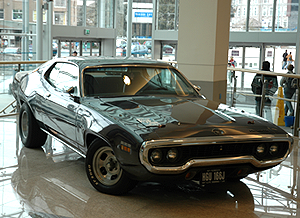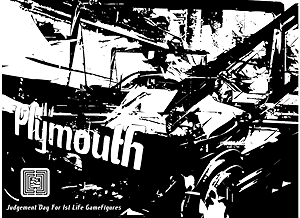|
algorithm
a collectively enplayed borglike Borges´ian psycho-active ´pata-geographic play map as meta-game over the city Judgement Day for 1st Life Game Figures
Injection of a writeable RFID chip can make our judgements stick. The
tagged person becomes a blank field in a database craving to be filled
in. The tag changes into a target, the roto-relief into a bull's
eye...
Dr. Aamin ben Kassim, Cairo and gHack, Munich/Vienna for Ludic Society, 2007 “TAGGING THE CITY” is a multi player computer game, played in the real cities. The situatedness of this pervasive play is given by the use of mobile and ubiquitous computing devices. RFID tags, both as implant on real players and on real world objects integrate the so called “Internet of Things” in a new game format of useless Zero objects- to contradict the space time rules of Spimes (Sterling, 2003) by play. This Play is no game! There are no fixed rules but a clearly defined goal, namely de-pricing the networked world of marked things. The games goal is to place, find and overwrite tags (with zero information).
An essential part of each Real Player's inventory is is beside some conventional tagging tools, a specially designed toy gadget to sniff and alter the state of RFID-Tags, the “Wunderbaeumchen”. They are self made and designed RFID scanner/reader/zapper, in short data-odour refreshers. The ability to write/destroy existing RFID Tags and to record their situation is part of the Toolkit-Box.
Then each player drives to the local pit stop, equipped with a RFID reader for flesh-implants, where she can access her upload interface. The Online Game Interface/Display shows a score of each player depending on objects tagged and de-tagged (like a game-HeadUpDisplay, HUD) and different layers of tagging routes can be cycled through by an online version of the map. a map movie is the result. //In level two the tags can be taken from their location and be placed over existing tags. The game goes on... WE SELL PLAY - NO GAMES!
The Ludic Society present their Tagged City Play for Real Players in Real Cities, using a Plymouth [car] for the Plymouth Play. A local shop serves as a pitstop/workshop location: Being Tagged! Tagging! play for a Borges'ian psycho-active 'pata-geographic play map over the city.
3rd Life Game Figure Recruiting!
by the Ludic Society Chapter Zurich Scenario: Injection of “RFID Judgement tags” under the skin of “Real Players” at a public shopping mall, mise en scène as game-play spectacle. The Ludic Society meets the Society of the Spectacle (La société du spectacle, Guy Debord 1967) in a play. A nurse and doctor serve as (at)tractor and fantasy game figures, who proclaim the slogan: Become a game figure by implant! Real Players are 1st life personae, who decide to become game figures in the Reality Engine. They play in a real city. The Plym city play motto is: Tag the City!
A Tagged City Play with The Tagging Toolbox!
As a bonus the Real Players can drive tuned Plymouth racing cars to tag Plymouth city. Players are provided with a tagging toolbox containing a variety of tag utensils: graffiti, spray stencils, stickers, RFID stickers and implant injection kits.
Self Conducting Electronic Wunderbäumchens!
These gadgets refresh the view through the window of the car and the data of RFID tags. These car bling-blings blink, emit signals and conduct the Real Players “Internet of things” into the Reality Engine of named objects. “Dérive Pin-ups” for cars, of 'pataphysically derived, mechanical brides, advertise the Wunderbäumchens, as additional self-sufficient new bachelor machines for the Real Players in real cities!
The Pit Stop!
A speciality of the Plymouth city play is that although it is a locative play with mobile electronic devices, the players come in person to the play's Pit Stop (a shop in the city centre) to be refreshed and to be read. The tagged body is one of the game-interfaces. The tagged person appears as a life game figure. In the local Real Play Pit Stop the simple ID in-formation carried by the bodies of game figures is uploaded. The implants of players are scanned to receive an individual play time pattern.
A Borges´ian Psycho-Active ´Pata Play Map! This map is a collectively en-played graphical machine. The display shows the score of each player depending on objects tagged and de-tagged. Depending on each player RFID-number, it generates a graphical element to display the routes between tagging actions over a pimped home-brew on-line satellite map. The individual “signature” element of each player is called “squiggle”. The psycho-active 'pata play map overlays all squiggles to generate a collective image. It uses additive layers to merge the individual route graphs into 2-dimensional graphics. The on-line visitor of this map can cycle through the different layers of tagging routes. Each layer is a player!
(In a further update after the Real Play, you can send the RFID number by SMS and get the info on your mobile phone. This service is planned for non-player characters, who occasionally cross the subjective psycho-geographical route of the players in the city.)
A Satellite Map fed by Real Players!
The play interface integrates GIS systems such as Google Earth and Wikimapia. The graphical upload interface is loaded when the player is identified with the local pit stop implant reader. Each player manually sets graphical markers, Wunderbäumchens. Equipped with another Wunderbäumchen, the device-art styled RFID reader, he/she uploads a set of ID numbers of objects tagged and names of objects de-tagged. Names are developed out of the ciphers by Cabala rules! If the RFID info of an object is deleted, it gets a name instead. The more players upload, the more the game interface commixes the individual tagging squiggles to generate a collective image of the Internet of things, now appearing as a collective naming-ground.
The look of the map as game score and display, for uploading subjective play data, forms the uncensored on-line map of “the Internet of things”! The commixed stencil-style satellite game map unmasks the satellite truth. It shows the outdated images of GIS systems, unveils the rules of play of systems such as Wikimapia and Google Earth, the intentionally chosen constructions of certain geographical data companies. The images given to the public are more of a political decision, a purposeful set of rules – but not a game in the sense of a wilfully taken constraint. Nevertheless, a game interface appears as the adequate choice for these new maps of the world.
A Plymouth Speedcar for the Plymouth Play!
The tags are used to judge certain locations of the city! When the game map and war driving Plymouth cars are presented at the Plymouth Shopping Mall and Arts centre, then it's Judgement Day (on 24th March 07) in Plymouth, UK! The Pit Stop is installed not only for the Real Players, but also for the play vehicle in Plymouth city: the legendary 70s sports car named “Plymouth”. These cars carry the tool kits and mobile devices for the flummox in-formation play.
In the words of the Ludic Society member gHack (LS Magazine issue3, 2007), passing judgement on an object/person with an RFID tag is, in the sense of Niklas Luhmann, no act of communication. It is a simple stupid act of in-formation and, in the end, de-formation. In the British TV series “The Prisoner” (1967-72 ) each effort to escape with a sports car is spoiled by a deforming giant bulb. “I will not be filed, stamped, indexed or anything. I'm not a number. I'm a free man,” asserts Patrick McGoohan as character “Number 6”. In the “Tag the City Play”, each play object tagged is determined, de-valuated, and NOT filed, stamped, indexed or anything by a tagged and numbered play figure.
The Situated Game-Play of Real Play!
The difference to existing locative mapping games is that it is no Game, just play, according to the Ludic Society slogan: We sell Play – no Games!
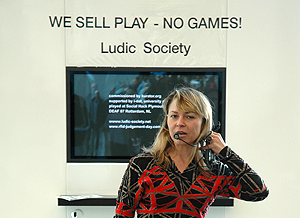 This means that there are no fixed rules, negotiable outcomes of the play, but a clearly defined goal, namely de-pricing the networked world of marked things, and a flexible tool-kit for the play of tagging the city. The outcome of a tag set on the play-map is open. The Real Player actions cumulate in a collectively “Borg-like” constructed “Borges”-ian psycho-active play-map. Jorge Luis Borges (1941) describes a map that occurs at a 1:1 scale, as large as the territory which it represents. A Borgesian 'pata-active map displays a meta-game played 1:1 in the Reality Engine over the city, blowing up the most tagged sites with the value Zero.
This means that there are no fixed rules, negotiable outcomes of the play, but a clearly defined goal, namely de-pricing the networked world of marked things, and a flexible tool-kit for the play of tagging the city. The outcome of a tag set on the play-map is open. The Real Player actions cumulate in a collectively “Borg-like” constructed “Borges”-ian psycho-active play-map. Jorge Luis Borges (1941) describes a map that occurs at a 1:1 scale, as large as the territory which it represents. A Borgesian 'pata-active map displays a meta-game played 1:1 in the Reality Engine over the city, blowing up the most tagged sites with the value Zero.
As in the absurd fantasy of Italo Calvino's (1972) invisible city, the game-play of this Real Play focuses on things we don't normally name and see as play objects. This absence, marked with RFID stickers, defines the players' personal game map developed in the course of the play in the city - instead of adding another boring data layer to reality (like most Google Earth/ map applications do).
The Gamegold Sweatshop Workshop!
A Pit Stop workshop is held, from 21st-24th March 07 at the local sweatshop.
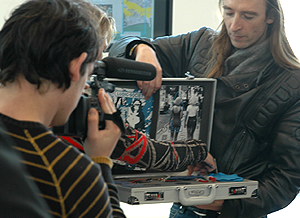 Every participant can become a game figure with an implant and be prepared for the Judgement Day Real Play. As an option the tag can be swallowed in an initiation ceremony. Workshop topics: Capture the flag, tag teams, game play development, last man standing, tool kit box, being tagged, tagging cities. Workshop exercises: Tag and de-valuate objects, re-programme tags and toy gadgets, adding the value Zero. The conceptual disjunction of play and game is elaborated in an exemplary ludic way. The rule of play (necessary for a game, but not to play), the bondage, the constraint, is intentionally chosen to evolve a ludic poetics.
Every participant can become a game figure with an implant and be prepared for the Judgement Day Real Play. As an option the tag can be swallowed in an initiation ceremony. Workshop topics: Capture the flag, tag teams, game play development, last man standing, tool kit box, being tagged, tagging cities. Workshop exercises: Tag and de-valuate objects, re-programme tags and toy gadgets, adding the value Zero. The conceptual disjunction of play and game is elaborated in an exemplary ludic way. The rule of play (necessary for a game, but not to play), the bondage, the constraint, is intentionally chosen to evolve a ludic poetics.
Each Real Player gets a special Quest. First: tag the city with a stencil graffiti to achieve a Full City Tag (=the complete city is systematically tagged). Fully subjectively and collectively, every player can pass judgement by tagging objects, buildings, vehicles, persons and is judged by wearing a RFID Tag under the skin. Second: scan tags with the Wunderbäumchens and change the Internet of things into the value Zero. Third: take souvenir photographs of Plymouth tags and the Plymouth. The Real Play extends the game zone into a situated locative play in a real city. Come and judge with your tag!
Ludic Society Magazine Xtra issue!
A shop in Plymouth becomes a sweatshop, where the ludic
magazine is sold for “real” Lindendollars. The “difference that makes the difference” (Bateson) is to feel the toy implant under Your skin. Buy the implant off the shelve!
DISCLAIMER
Every participant becoming a 3rd Life Game figure must assume full responsibility for any consequences of using the Reality Engine in the PLAY. The Ludic Society is not responsible for any physical or mental damage or intents to harm objects in the city during or after the PLAY.
Jargon-File
Real Players in Real Cities: a “Real Play” is played in 1st Life, the Reality Engine! A Real Play is designed in this best game engine available. Such a play constitutes as contingency game concept. It appears as classifiable in the genre of computer games, although rendered in the full city reality. Adhering to mercurial thievishness (=to steal from computer games) as a massively Real Player authenticator obviously constitutes the first constraint of the distinct level of Real Plays that is hereby entered. Real Play was introduced by the Ludic Society as an ouvroir (=garage) for the unexpected, for contingency and imaginative solutions.
Target: deprice tagged objects, enplay the world map
GoApe! |
|
|
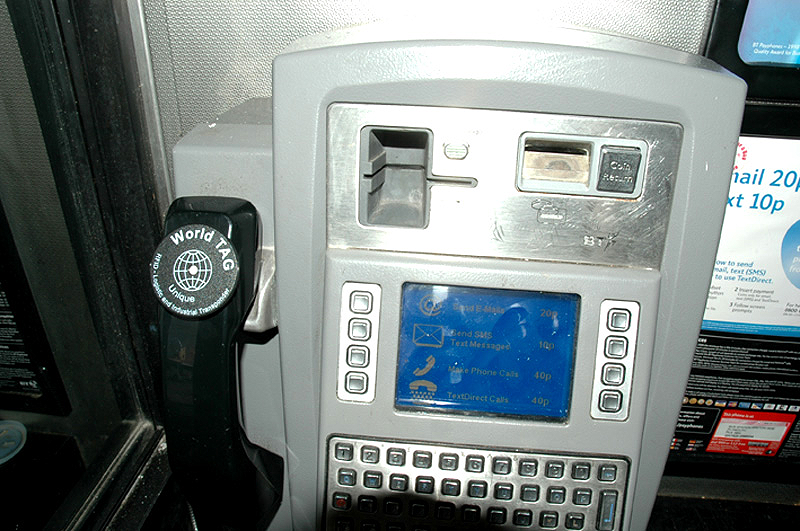
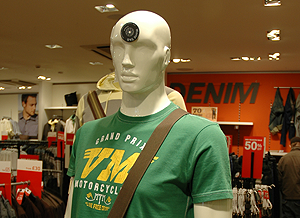 //In level one the players jump into plymouth cars, to gain public attraction when they stop next to a site, and fix a tag with hammer and nail on the wall. Then they take a photo and start the engine again to drive away.
//In level one the players jump into plymouth cars, to gain public attraction when they stop next to a site, and fix a tag with hammer and nail on the wall. Then they take a photo and start the engine again to drive away.
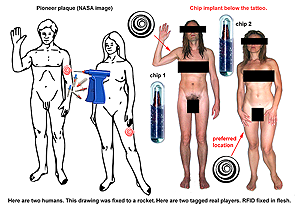
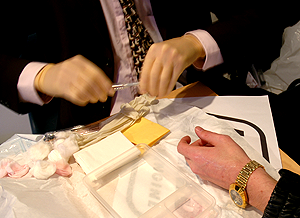
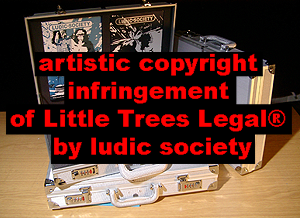

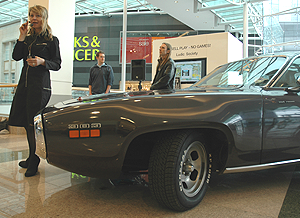
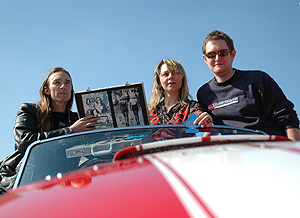 All the tagging data (status of tagged objects, souvenir pictures of city tags, of non-player people with marked sites, of Real Players with Plymouth cars and geographic marks, photos of tagging sites, topographical data of longitude and altitude collected with mobile gadgetry) is carried by Real Players with their tagged real bodies to the Pit Stop. The Pit Stop also serves as local meeting point/ exhibition site for Real Players, where they talk and form tag-teams.
All the tagging data (status of tagged objects, souvenir pictures of city tags, of non-player people with marked sites, of Real Players with Plymouth cars and geographic marks, photos of tagging sites, topographical data of longitude and altitude collected with mobile gadgetry) is carried by Real Players with their tagged real bodies to the Pit Stop. The Pit Stop also serves as local meeting point/ exhibition site for Real Players, where they talk and form tag-teams.
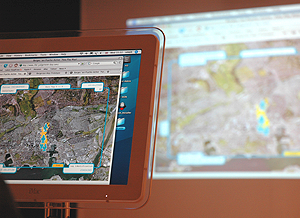
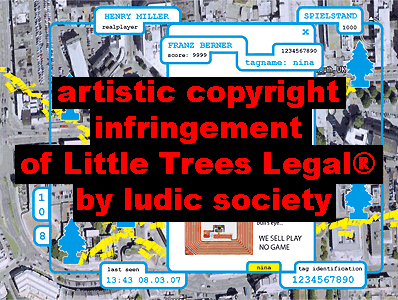 The non-player visitor sees an overview of all the sites of city tags (evaluated and de-valuated ones). Each location of a tagging action is marked with a Wunderbäumchen sign, resembling the Wunderbäumchens spread throughout the city. Souvenir photos and additional commentaries in different formats can be viewed at these spots . The option of adding commentaries or coming to the pit stop with further information about other zero-tags is open to every non-player character!
The non-player visitor sees an overview of all the sites of city tags (evaluated and de-valuated ones). Each location of a tagging action is marked with a Wunderbäumchen sign, resembling the Wunderbäumchens spread throughout the city. Souvenir photos and additional commentaries in different formats can be viewed at these spots . The option of adding commentaries or coming to the pit stop with further information about other zero-tags is open to every non-player character!
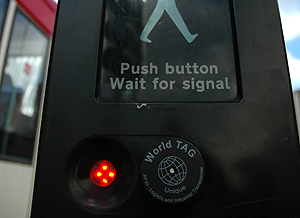 All real objects of the world that are marked with tags can be found via these kinds of Google/earth/maps. A map of this kind, revealed through play, should not give the impression of a neutral image of reality. From a ludic point of view it needs a HUD style, at least a game-like integrated graphical Heads-Up Display.
All real objects of the world that are marked with tags can be found via these kinds of Google/earth/maps. A map of this kind, revealed through play, should not give the impression of a neutral image of reality. From a ludic point of view it needs a HUD style, at least a game-like integrated graphical Heads-Up Display.
